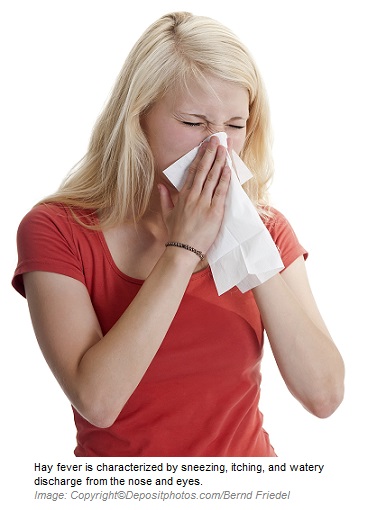Also known as allergic rhinitis, hay fever is an allergic condition triggered by external
 allergens and characterized by sneezing, itching (in nose, throat, and eyes), and watery discharge from the nose and eyes. Severe cases may be associated with general fatigue, tiredness, headache, and muscle soreness. Despite the name, fever is usually absent.
allergens and characterized by sneezing, itching (in nose, throat, and eyes), and watery discharge from the nose and eyes. Severe cases may be associated with general fatigue, tiredness, headache, and muscle soreness. Despite the name, fever is usually absent.
Hay fever may be associated with asthma, infection of the sinuses, and food allergies.
Potential allergens that trigger hay fever are:
- Pollens from ragweed, grasses, trees, and weeds.
- Fungal spores.
- Animal dander.
- Feathers.
- House dust mites.
Nutritional Supports:
Restricted Foods:
- Sugar and sweets. They have negative impacts on the immune system.
- Foods high in yeast and mold: beers, aged cheese, dried fruits, melons, and peanuts.
- Saturated, and Trans fats.
- Alcoholic beverages.
- Carbonated beverages.
- Refined foods.
- Process foods.
- Food colorings, flavourings, additives and preservatives. They are common sources of allergies.
- MSG (monosodium glutamate)-containing foods.
Recommended Foods:
- Drink plenty of water: at least 2 liters a day.
- Whole grains.
- Lean protein: fish, turkey and chicken.
- Fresh vegetables.
- Flaxseeds.
- Unsweetened yogurt.
- Warm soups and broths.
- Foods high in omega-3: fish, flaxseeds, chia, and hemp seeds.
- Fruits and vegetables high in flavonoids: berries, grapefruit, pomegranate, sea buckthorn, persimmon, kiwi, beets, basil, garlic, parsley, radish, radicchio, rhubarb and parsnips. Flavonoids especially quercetin may alleviate symptoms of hay fever.
- Ginger.
- Cinnamon.
- Turmeric.
- Green tea.
Recommended Supplements:
- Quercetin: 1000– 2000 mg a day. This flavonoid can reduce the symptoms of hay fever through its anti-histamine activity.
- French Maritime Pine Bark Extract: 100 – 200 mg a day. It is a powerful flavonoid that has antioxidant, anti-inflammatory, and immune boosting activities.
- Grape Seed Extract: 50 – 100 mg a day.
- Omega – 3 Fatty Acids: 2 – 3 grams a day. They reduce inflammation.
- Vitamin C: 2 – 3 grams a day.
- Vitamin D: 2000 – 5000 IU a day.
- Vitamin E: 400 – 800 IU a day.
- Tylophora: dried leaf 200 – 400 mg a day, or tincture 1 – 2 ml a day. The active ingredient in this herb is tylophorine, which has anti-inflammatory and anti-allergic properties.
- Thymus Extract: 500 – 1000 mg a day. Thymus extract is derived from the thymus gland of cows and improves immune function. It is used in allergies, hay fever, asthma and bronchitis.
- Colostrum: 500 – 1500 mg a day. It may reduce allergic reactions by providing immunoglobulins.
- Digestive Enzymes: A full spectrum product.
- Probiotics: a product that provides minimum 5 to 10 billion active organisms per serving.
Miscellaneous Suggestions:
- Immunotherapy (sublingual or subcutaneous).
- Liver detoxification.
- Colon cleansing.

